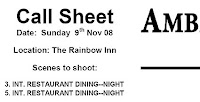 By Dan Parkes (Director/editor)
By Dan Parkes (Director/editor)It can be both a very happy and very stressful time for a filmmaker - that moment when the curtain is finally lifted on the film you have been slaving over for months and it is finally seen by an audience for the first time.
The date for the Ambleton Delight premiere was timed to launch a film festival, and hence was a date that was not going to move. It was advertised, free tickets for cast and crew arranged, champagne ordered and tickets put on sale for the public. While the film itself had been cut and effects completed, the sound mix (which was being done separately) began having delays and resulted in final touches being made literally the day before the premiere. But considering it was actually nine months from first draft to premiere, this should not be completely surprising!
The premiere itself was very successful, with 200 in attendance including both cast and crew, special guests and those who bought tickets. Most importantly it was a time to say thank you to all those who helped make it happen. Here are some tips we found on organising a premiere:
- Don't leave it to the last minute. Although your concentration will likely be on completing the film you need to start thinking about the premiere from a very early stage.
- Location. Obviously a real cinema is the best place, but it might be expensive if you are hiring it. If you can organise it to be shown in a festival then that could solve the problem. Otherwise there are many other non-cinema options you can consider. In the past we have premiered films in a library, a hotel and in a school.
- Cast and crew. This is where it can get tricky. Make sure you have an accurate guest list that includes all cast and crew and also those who may have helped in some other way. It might be a good idea to start making this list early in the production so you don't accidentally forget someone in the last minute rush. Also, don't forget to allow each person to bring a guest.
- The guest list. Don't just invite those who were involved in the making of the film. Also invite those from the industry and community along to make it an extra special event and to allow for networking opportunities.
- Seating. If in a cinema you might want to allocate a special area (such as the back rows) for cast and crew. If not in a cinema you might want to make sure the seats will be comfortable enough for the duration of the film.
- Food and drink. It is good if a glass of champagne or wine can be provided to celebrate the event. If you are unable to afford this or get it sponsored then at the very least give people a bag of popcorn!
- Test the facilities. Don't ever premiere an event without having first tested the film on the projector and screen to make sure it will look and sound good enough.
- Advertise. Send out invitations well in advance and if advertising tickets start looking at ways of getting your premiere known: noticeboards, flyers, posters, e-mails, newsletters etc.
- Dress code. From experience most people like to dress up -but make sure everyone knows what is expected. If there is a very formal dress code then this may put some off -especially if they arrive without realising it is the case!
- After party. many will want to network or party after the event -if this is not possible at the screening location you might want to think of what facilities are nearby that could be used for this.
- Official photographer. It is still part of the production process -so make sure to have an official photographer to record the event.
- Festivals. You might also want to think about how the premiere may impact on your festival and sales opportunities. If you have a sales agent or even distributor it is best to discuss this first with them. Also if a film is screened in one country that may make it ineligible for some festivals.













